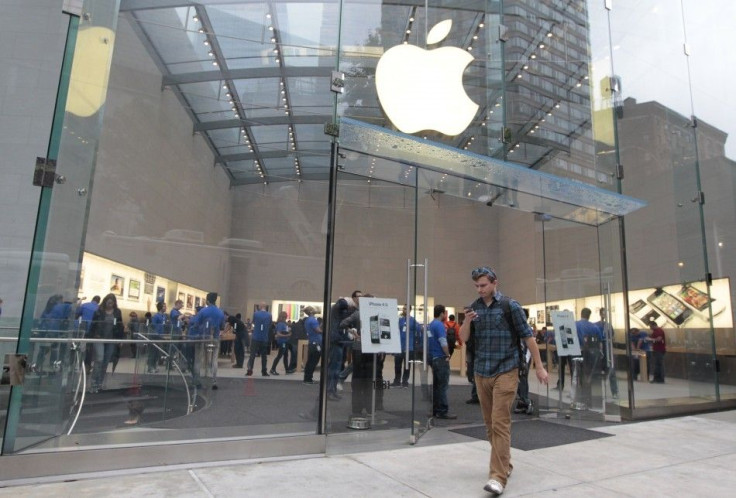The Wall Street Journal Failed Its Readers on Apple-Iranian Discrimination Scandal

The Wall Street Journal, a property of News Corp. (Nasdaq: NWSA) and AOL Inc.'s (NYSE:AOL) Huffington Post got into an editorial tiff over the weekend regarding the facts surrounding recent allegations that Apple Inc. (Nasdaq: AAPL) employees wouldn't sell iPads and other merchandise to Farsi speaker Sahar Sabet and other people of Iranian-descent. The WSJ editorial claimed that the allegations were leveled against Apple to assist the Iranian regime, while the Huffington Post editorial by the woman's attorney called the factual accuracy of the editorial into question.
At the end of the day, though, it seems the issue is bigger than editorial sniping between two publications. The more troubling issue is that the WSJ failed in its journalistic obligation to ensure factual accuracy, even on the editorial page. The WSJ's editorial by Sohrab Ahmari was blatantly fallacious on multiple counts. Representatives of the WSJ did not immediately return calls.
The WSJ's editorial by Iranian-American writer and neocon darling Sohrab Ahmari lays out a case defending Apple against accusations by Iranian-American University of Georgia student Sahar Sabet. In his editorial, Ahmari, famous for his hawkish views and incendiary ideas, claims that Sabet was attempting to purchase an iPad for her cousin in Iran, that Apple issued an apology to Sabet, and that the campaign led by the Council on American Islamic Relations (CAIR) and National Iranian American Council (NIAC) to defend Sabet is really an attempt to undermine U.S. sanctions on Iran's theocrats.
The wider outrage is baseless. Apple is known as a company with strong diversity policies and the incident was clearly an exception. I have spoken Persian at multiple Apple stores, to no adverse effect. It would be unfortunate if, amid rising tensions between the U.S. and Iran's mullahs, the historically well-integrated and successful Iranian-American community were to take up CAIR-style grievance-mongering, Ahmari wrote.
Huffington Post, though, cried foul. According to Huffington Post's counter-editorial by attorney M. Khurram Baig, who represents Sabet, Ahmari's claims about the events are just plain factually wrong. Sabet was not trying to purchase an iPad for a cousin in Iran (rather, it was for an older sister in North Carolina), she was identified by the Apple store employee because she was speaking Farsi, the language of Iran, rather than because she said she was buying an iPad to send back to Iran, and Apple has not in fact issued an apology to Sabet.
Contrary to Mr. Ahmari's assertion that Apple was within its rights to deny the sale and that no discrimination took place, the facts are abundantly clear that Ms. Sabet was treated differently than every other person who walked into that Apple Store on that day because of her ethnicity and national origin. Frankly, Mr. Ahmari should invest more energy confirming the facts surrounding the incident in question and less time attacking the victim, Baig wrote.
Both sides of the argument should be taken with a grain of salt. Baig is defending his client in his editorial, and thus is obligated as her attorney to present the events in the best possible light. Ahmari has a long history of inflammatory comments and a well-established vendetta against NIAC and CAIR. Ahmari essentially uses Sabet's case in the Apple store as a means of attacking CAIR and NIAC, and throws the established facts of the allegation under the bus while he does it.
While there has been no legal decision in the case, Ahmari's editorial in the Wall Street Journal displays a flagrant disregard for factual accuracy in an attempt to score a few right-wing political points. The idea that defending a U.S. citizen against discrimination in a store is tantamount to assisting the Iranian regime to do ... something (he does not specify what) is laughable at face value.
Moreover, the fact that Ahmari's entire argument is founded on falsities renders his conclusions fallible. Not only do Baig's and Sabet's version of the events at the Apple store directly contradict everything Ahmari based his editorial on (as do the accounts of a myriad of established media outlets), his statement that Apple issued an apology to Sabet is undeniably wrong and can be substantiated without relying on Sabet or Baig's words. A simple visit to the Apple website will reveal that the company made no such statement (Apple did not return calls regarding this matter).
Furthermore, the U.S. State Department has made it clear on multiple occasions that the embargo against Iran would not prevent Apple store employees from selling iPads or other merchandise to Iranian Americans or Iranians in the U.S. on student visas.
Additionally, while Ahmari singled out NIAC and CAIR in an attempt to claim pro-Iranian political motivation in the allegations against Apple, he notably ignored the fact that multiple secular civil liberties organizations including the American Civil Liberties Union, Iranian American Bar Association, Asian Law Caucus, Public Affairs Alliance of Iranian Americans and the PARS Equality Center were joined by NIAC and CAIR in calling on Apple to apologize and change its policies. That Ahmari, who recently tweeted that There's no such thing as a 'moderate Islamist' singled out CAIR and NIAC, which he refers to as Tehran's unofficial lobby in Washington, while ignoring the other organizations smacks of twisting facts to support a political agenda rather than a concern on behalf of Apple.
Of course, the editorial page is the place for opinion, and the WSJ did nothing wrong in publishing Ahmari's opinion on that page. However, the WSJ does have a journalistic obligation to ensure that its editorial writers aren't fabricating facts and distorting events for their own political ends. While it's too soon to say that Sabet was wronged or, conversely, that Apple was in the right, it is not too soon to say that the WSJ and Ahmari were at best sloppy and at worst journalistically negligent in how the issue was addressed on the editorial page.
© Copyright IBTimes 2024. All rights reserved.




















